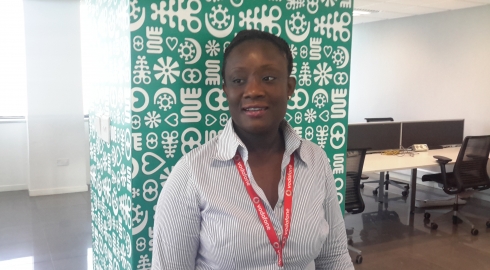The everywomanWorld series makes a pit stop in Ghana’s capital, Accra, where we caught up with Iris Owusu-Manu, 38, for a chat about her working life as HR Business Partner (Corporate Functions) & Diversity & Inclusion Lead at Vodafone Ghana.
In the beginning:
My parents were bankers and so naturally they tried to encourage me into the finance world. I, however, wanted a career where I’d be able to interact with people on a daily basis and in this regard I went to university to study social sciences.
I wanted a career where I’d be able to interact with people on a daily basis.”
My career path:
Under Ghanaian law, on completing your education you spend one year working in a public sector role to earn an allowance and a certificate of completion allowing you to enter the job market. I had two National Service jobs; first, doing administration for an education office, and second, teaching English in a primary school. My first job was in the customer services team at Barclays Bank, where I was able to pursue my dream of a career built on human interactions. My husband went to Edinburgh to study and when the opportunity came along, I followed him to the UK and did my MBA at a London university, while simultaneously working as an HR assistant, first in a hospital and later for a courier company. After the birth of my second child we moved as a family back to Ghana, where, in 2010, I landed my first role with Vodafone as Employee Relations Advisor.
I’m at my desk in the area of Accra we call Airport City – where there’s a huge ongoing regeneration project – by 8am, following a one hour commute from the suburbs. I’m responsible for the workplace wellbeing of 200 Vodafone employees and so day-to-day I’ll be meeting with colleagues at all levels across the organisation to discuss issues or grievances, training and development needs, or working with hiring managers to ensure any recruitment in progress is fair and inclusive.
I’m responsible for the workplace wellbeing of 200 Vodafone employees.”
Between meetings I’m immersed in Vodafone’s diversity and inclusion programme. The type of work I do is spread over what we call the four Cs. The first C stands for ‘colleagues’; every employee is unique and has a role to play in making us successful, so we have initiatives – women’s networks, for example – to engage each and every member of the team in our business. The second C is for ‘customers’ – they’re as diverse as our workforce; what my mother wants from her phone is different from what my brother wants; it’s important our products reflect those diverse needs.
Then there’s ‘community’ – our social responsibility to the world around us. I take the lead on our partnership with a rural orphanage which homes around 150 abandoned children, some as young as a week old. As well as financing projects, our all-female team spends time at the orphanage, doing maintenance work, reading to and playing with the children, and delivering donations of essential supplies. We also work with Help The Aged, to whom Vodafone recently donated specially designed ‘grey friendly’ phones created to assist the elderly with large keys, SOS emergency functions and a built-in hearing aid.
Finally there’s ‘communication’ – sharing our colleague, customer and community work with everyone involved in Vodafone. Day-to-day that can mean sending organisation-wide emails and speaking to the media or people in charity organisations.
“Empowerment of women in the workplace is very much on the agenda in Ghana.”
Job satisfaction: Empowerment of women in the workplace is very much on the agenda in Ghana. There’s a huge shortage of women entering science, technology, maths and engineering positions and my work at Vodafone is taking specific steps to bridge that gap. I run programmes aimed at encouraging girls into STEM studies, careers and eventually leadership positions. That’s my small contribution to solving the problem.
My role model: I grew up in a house with older brothers in a culture where boys and men are often considered the ‘masters’. But my mother didn’t stand for that kind of attitude; in our house we were all equals. I think that really shaped my view of women in the workplace and the world.
In our house we were all equals.
My biggest lesson: Throughout my career I’ve had great bosses and mentors who’ve supported my self-belief and helped enable a good work/life balance. When self-doubt has crept in, my managers have made it clear that they’ve asked me to do something only because they believe I can. That realisation can help shake off limiting beliefs.





